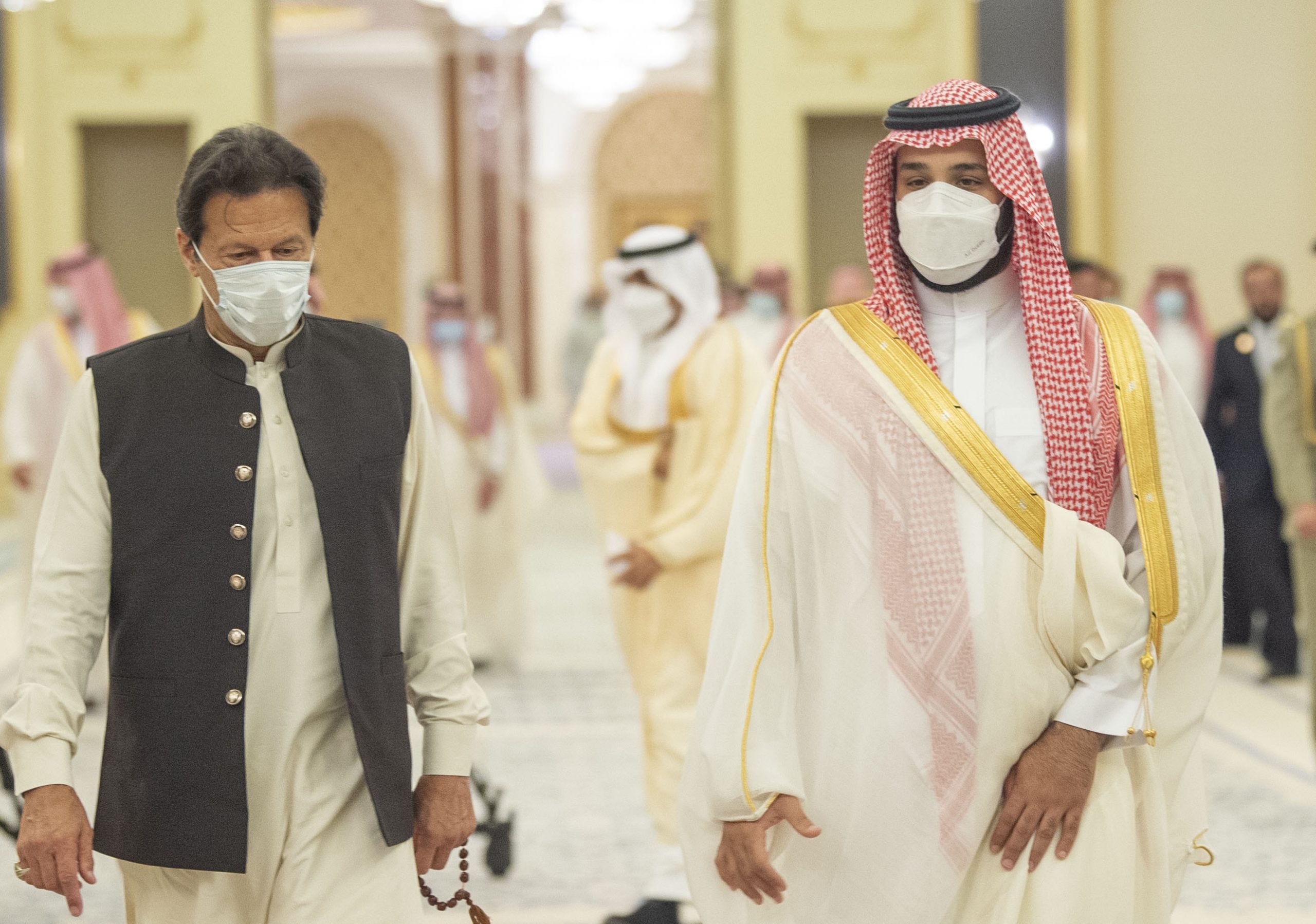At a time when the Taliban has gained full control over Afghanistan and there is no sign of any armed opposition in the country, Pakistan is helping the Taliban secure international recognition.
The Taliban’s control of Afghanistan has created opportunities for some countries, while others see challenges to their power ambitions. Iran and Saudi Arabia are the Middle East’s irreconcilable rivals and often adopt opposing positions on Afghanistan. The current situation in Afghanistan is tricky for the Saudi regime and Iran in Afghanistan. The Saudis were one of the three countries, along with the UAE and Pakistan, to recognize the first Taliban administration in 1996.
Iran is now among the few countries that still operate embassies in Kabul after the Taliban takeover of Afghanistan. However, the Saudis do not seem inclined to recognize the Taliban, as the geopolitics of the region has changed significantly in the last two decades. However, the Saudi situation could change at a moment’s notice should Washington push them to adopt a certain position that might serve Western interests.
Saudi Arabia froze diplomatic ties with the Taliban regime in 1998 after their refusal to hand over Osama Bin Laden. Bilateral relations were completely cut off with the Taliban regime in 2001 after the terror attack in the US when the Saudi Kingdom expelled its charge d’affaires at the Afghan embassy, Moulay Muti’ullah. The Saudis also tried to discredit the Taliban by organizing a conference of ulema (Islamic scholars) in 2018 to pass rulings against the group and delegitimize its “jihad”. Those were the days when the Saudis relied on the ulema to gain legitimacy for their rule.
Since the eruption of the so-called Arab Spring in 2011, Saudi Arabia has seen Muslim countries that adhere to Islamic principles in statecraft, politics, or economics as a threat. They may look unhinged as an obsession with self-preservation dominates their minds. The Saudi government would not want the Taliban regime to talk about a Sharia-guided form of governance, especially at a time when Saudi Crown Prince Mohammed Bin Salman is on a “modernization” drive in his Kingdom.
The recent Saudi blanket ban on the activities of Tablighi Jama’at an apolitical, quietest movement of internal grassroots missionary renewal, is linked with developments in Afghanistan, as both the Taliban and Tablighi Jama’at identify themselves as part of the Deobandi Sunni movement that had its origins in British India. Most of the prominent Taliban leaders have graduated from Deobandi seminaries in Pakistan, including its late founder, Mullah Mohammad Omar.
The Taliban government has close relations with Qatar, which has been hosting its political office since 2013. Qatar played a crucial role in the Taliban’s peace talks with the US and is now helping the new Kabul rulers in different aspects of administration.
Iran has maintained ties with the Taliban since 2015. Having discovered a common threat in the ISIS/Daesh terror group, Tehran collaborated with the Taliban to help contain the international terror outfit. Iran also negotiated and hosted several rounds of talks between the Ashraf Ghani administration and the Taliban. Iran maintains its embassy in Kabul and has cultivated a good working relationship with the Taliban.
The Saudi Kingdom feels isolated after the US withdrawal from Afghanistan. The Saudis would want assurance from Pakistan that Afghanistan would not align with Iran and not become a part of the Qatar-Turkey alliance. Pakistan’s geopolitical ascendancy in Afghanistan is not a bad sign for the Saudis, even though the Saudi government’s inclination towards Pakistan’s arch-rival India in the last few years is a development that Islamabad looks at with concern. The Saudi-Iran competition in Afghanistan is certain to force the Saudis to use Pakistan to manage their affairs. As Iran is trying to develop an understanding with Pakistan on Afghanistan, the Saudis have already lost valuable time.
The Kingdom also wants to stay on the good side of Pakistan’s Inter-Services Intelligence (ISI), which will not only have influence with the Taliban but is also shaping the direction of the Taliban government in Kabul. Although Saudi Arabia’s interest in Afghanistan has not changed from the past, a more Western-oriented Saudi regime would not want the same kind of bonhomie with the Taliban as it used to have during its first stint in power. So, the Saudis would like to avoid any comparison to the Afghan Taliban.
Pakistan’s ties with both Saudi Arabia and Iran have been tumultuous in the last few years. Tensions escalated when Pakistan refused to take part in the Saudi military misadventure in Yemen. On the other hand, bilateral relations between Tehran and Islamabad have considerably improved due to frequent visits and negotiations in the last two years. Before that, in 2017, tensions prevailed due to cross-border attacks on both sides.
Saudi Arabia has very few options left if they want to remain relevant in today’s Afghanistan, and Pakistan is their best bet to have some influence in Kabul. Saudi Arabia’s deep coffers put Riyadh in a better position than sanction-hit Iran. Furthermore, the Saudis are known to make a public show of buying foreign influence with their petrodollars.
Iran will have to rely on old-fashioned diplomacy, trade, and strategic initiatives to influence Pakistan’s policies so that the Saudis are not able to gain undue influence in Islamabad and Kabul. With some patience, Iran will also be able to exploit Saudi Arabia’s rashness in its policies. With the Saudi zeal to please Jewish lobbies, Iran will have plenty of opportunities to discredit the Kingdom.
Iran has something that Saudi Arabia can never have: a border with both Afghanistan and Pakistan. For Pakistan, Iran’s positive role in Afghanistan is more significant for stabilization and recognition of the Taliban rule in Afghanistan. However, Pakistan would not be willing to concede too much ground to Iran in Afghanistan.
While Saudi Arabia’s irrelevance is growing, Iran is more active diplomatically. On October 27, Iran hosted foreign ministers from Russia, China, Pakistan, Tajikistan, Uzbekistan, and Turkmenistan — the six members of the so-called Moscow format talks on Afghanistan.
For Pakistan and Iran, it is in their mutual interests to ensure that Afghanistan becomes a stable place and later part of a wider regional economic and transport network.
Although the recent Afghanistan-Iran border clash was described as a “misunderstanding” by the Iranian authorities, the possibility of such misunderstandings may increase in the future. In such a situation, Pakistan’s mediation role would expand.
Saudi Arabia is currently keeping its role in Afghanistan at a low level, but Riyadh cannot remain indifferent in Afghanistan for long. They tend to have policy fevers in Riyadh, and one day they may develop an urge to play a big role in Afghanistan. If that happens, they would have to use Pakistan’s leverage.
Saudi Arabia’s capacity to influence cash-strapped Pakistan’s decision-making is evident from Islamabad’s withdrawal at the eleventh hour from the Kuala Lumpur conference in 2019. Nevertheless, Afghanistan is a more complex issue, and Saudi Arabia may realize that throwing tantrums does not always work. Given Pakistan’s history of managing conflicting interests, it will not be very difficult for it to manage Saudi and Iranian ambitions in Afghanistan as long as Kabul has a decent government.














